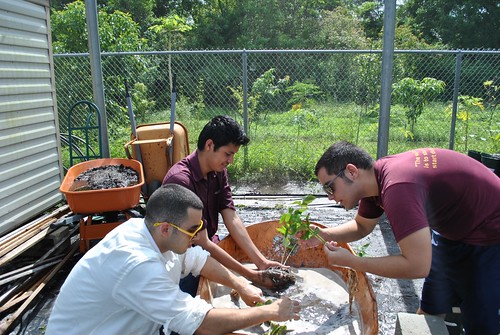
This post is part of the Science Tuesday feature series on the USDA blog. Check back each week as we showcase stories and news from USDA’s rich science and research portfolio.
Some say careers in agriculture are a thing of the past, but don’t tell that to Krish Jayachandran, a professor and co-director of Florida International University’s (FIU) Agroecology Program. He will tell you that agriculture is the wave of the future—and he is backing that statement with nearly a decade of work to ensure the next generation of agricultural scientists are ready.
“If we are going to feed more than 9 billion people in the future, we have to get creative in how we use our soil and water resources—not to mention our over-reliance on the same kind of germplasm decade after decade,” Jayachandran said. “I tell students that agriculture research is not farming, it is science and technology. It’s thinking about bio-geo-chemical processes and nutrient cycling; on-farm and off-farm remediation measures, surface and groundwater management, and bioenergy.”
Jayachandran, along with agricultural economist Mahadev Bhat, began building his program in 2005, starting out with funding provided by USDA’s National Institute of Food and Agriculture (NIFA). Over the last 8 years, both Jayachandran and Bhat have provided 137 students with scientific internships through NIFA’s Hispanic-Serving Institution Education grants. In addition, he supported 24 bachelors candidates with NIFA’s Multicultural Scholars grants and 12 graduate students through the agency’s National Needs Fellowship Program. Bhat and Jayachandran also obtained International Science Education grants that supported students and faculty members engaging in international agriculture and biofuel studies in South America and India.
“Eradicating hunger would not be an easy task,” said Nall Moonilall, a Multicultural Scholar grant recipient who majors in environmental studies and Agroecology. “However, studying agroecology will equip students, like me, to be better prepared to face all of the challenges we would encounter in the future and to solve this global threat.”
Graduates from the Agroecology program have gone on to work at USDA agencies such as Natural Resources Conservation Service (NRCS), Agriculture Research Service (ARS) and Agricultural Marketing Service (AMS).
Through federal funding and leadership for research, education, and Cooperative Extension programs, NIFA focuses on investing in science and solving critical issues impacting people's daily lives and the nation's future.




